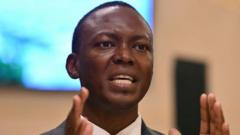Chad's political landscape has been thrown into turmoil with the recent arrest of Succès Masra, a former prime minister and opposition leader. The public prosecutor, Oumar Mahamat Kedelaye, has accused Masra of involvement in violence that erupted in the southern region of Logone Occidental, resulting in at least 42 fatalities. Authorities allege Masra spread incendiary messages via social media that incited hatred and potential violence.
Masra's party, Transformers, has vocally condemned his detention, labeling it a "kidnapping" executed by military personnel outside established judicial protocols. Known for his strong opposition to current President Mahamat Déby, Masra previously claimed that he was denied victory in the last elections, where official results declared Déby the winner with 61% of the vote.
Instigating violence, the clashes reportedly stemmed from rising tensions over land disputes between local farmers from the Ngambaye community and Fulani herdsmen, with conflicting interests over land use. Kedelaye stated that calls for armed resistance were disseminated through social media, aggravating an already volatile situation.
In the wake of these events, over 80 other individuals have also faced detention related to the violent outburst. Masra's brief tenure as interim prime minister spanned from January to May 2024, during which his party had opted out of legislative elections due to concerns about electoral integrity.
Chad has been under the dominion of the Déby family for over three decades, with President Déby assuming leadership following the death of his father, Idriss Déby Itno, during a rebel assault in 2021. This incident echoes ongoing struggles for power and stability within the nation, highlighting the intersection of politics, social grievances, and existing ethnic tensions in Chad.





















